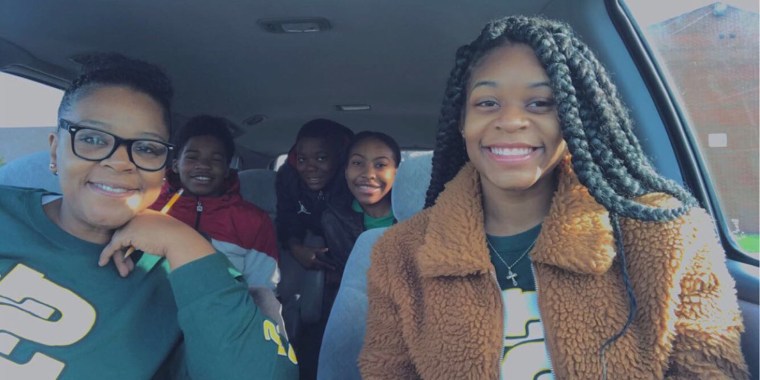Home-schooling looks a little different for some families across the country, especially those who can't afford unlimited internet access.
Tawana Brown of South Bend, Indiana begins each day by driving her family to a parking lot where school buses that are equipped with Wi-Fi are parked. She has been keeping up with this daily schedule after coronavirus concerns led to the closure of schools in the South Bend school district last month. Jacob Ward, an NBC News technology correspondent, spoke to the family about their unusual work setup.
"Each morning, Tawana Brown and her family park their van within range of free Wi-Fi because it's the only way she can afford to get her four kids connected to their schools," reported Ward.
Brown told TODAY that she and her four children, Ta'Nyi Reed, 17, Ta'Myra Reed, 16, Tyrin Reed, 13 and Taydan Reed, 10, stay in the lot from around 9:30 a.m. until about 11 a.m. Brown, who worked as a kitchen supervisor in one of her son's schools, says that while her kids do their assignments, it's her job to "keep the peace." They take breaks outside of the van to get some movement in as well.

Ta'Nyi has more than the usual amount of schoolwork to do as she's the president of her junior class. Brown says her daughter works hard to make sure her fellow high school juniors are turning their work in on time.
Since Brown worked for the South Bend school district, she learned of the bus Wi-Fi right away. She has pay-as-you-go internet at home, but with all the data her kids need, it's more affordable for her to use the bus Wi-Fi, which is available for free to the public, while she's out of work.
Brown has also started a family book club, where they take turns reading and then discussing the same book. "We're just doing what we can to try and make our day better," she said.
On March 18, South Bend Schools shared on Twitter how to access internet from the parked school buses.
"Bus Wi-Fi is now open to the public. Logon to SBCSC-Bus-Public, no password needed," read the tweet, which also mentioned that the city of South Bend is also offering free Wi-Fi, along with maps of different access points.
The coronavirus outbreak has only highlighted the fact that those without internet access in our country don't benefit from a level playing field.
Download the TODAY app for the latest coverage on the coronavirus outbreak.
"According to the census, we have 18 million households in the U.S. that do not have broadband subscriptions at home," says Angela Siefer, executive director at National Digital Inclusion Alliance. "Fourteen million of those 18 million are in urban areas."
There's a correlation between homes with no internet access and a greater risk from coronavirus, as people who don't have access to online bill pay, virtual doctor visits and online grocery shopping are going out more often and risking exposure to the respiratory disease.
"If you don't have broadband, you're not going to stay at home," said Siefer.
Brown says going to the buses has given her family a daily routine and a break from being inside. They also take advantage of the free lunches offered on the buses. She says she's surprised that more families aren't using the free internet access, and hopes that by sharing her story, she can raise awareness about the service to others in her neighborhood who may also have limited or no access to the internet.
"I don't see anyone else out there," she said of their daily trips to the school buses. "I hope other people will come out and take advantage of what South Bend is offering."
